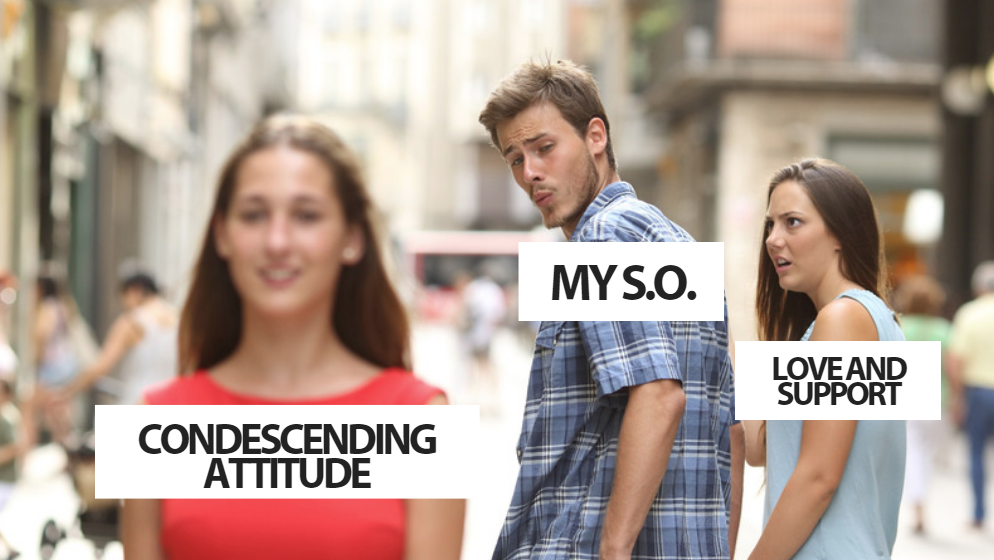You are here
6 Things That Are Scarier Than “Mental Patient” Costumes
October 31, 2017
By Jessica Kennedy, MHA Chief of Staff

It’s Halloween again.
That means candy (good). Too much candy (bad). Funny costumes (good). Offensive costumes (bad).
Every year we get calls about stigmatizing straightjacket costumes and “haunted asylums.” Which is a shame, because there are some people who might think that individuals living with mental health conditions are scary.
But what’s really scary isn’t someone with depression, anxiety, bipolar, or psychosis—it’s the experiences we have every day with people who judge and hurt us.
Here are six costumes that are scarier than “mental patient.”
1. The Unsupportive S.O.

“I just don’t understand why you have to pay someone to talk about your problems. Can’t you just solve them on your own?”
Why it’s scary: Hey partner, aren’t you supposed to be supportive, loving, and caring? I just opened up about what’s going on with me (which is scary, by the way), and you’re now actively trying to convince me not to get help. True story: My doctor asked me to tell my live-in partner that I was on a certain medication because some people experienced suicidal thoughts while using it. So I talked to my partner, just to get a long lecture about how I didn’t need to “be on meds.” He demanded that I talk to other people and get more opinions before he’d “let me” take my medication. And he made sure I knew that he was disappointed in me for taking meds every time I took a dose. You know what goes well with intense anxiety? Shame and disappointment. (Don’t worry, he’s an ex.)
How to actually help: Support the people you love and care about. If they’re doing something dangerous (like self-medicating with alcohol), there are other ways to approach the subject. Otherwise, just root for someone to succeed. Would you rather be right or happy?
2. The Infantilizing Parents

“Did you pay your rent this month? Did you make sure you schedule a doctor’s appointment? How are you getting to work tomorrow? You know that breathing goes inhale, exhale, inhale, exhale, right?”
Why it’s scary: To my well-meaning family: there are some things I need you to help me remember, like grandparents’ birthdays and my blood type, but I don’t want to be treated like an unruly teenager when I’m well into my adult years. And I know this comes from a place of love. I know that it is hard for you to watch me if I’m struggling and that you have this instinct to swoop in and rescue me, but constantly questioning everything I do makes me feel like I’m not a fully formed human. And that’s demeaning. If you’re my parents, and you don’t believe in me, who can?
How to actually help: Ask me how you can be supportive. Let me mess up a little bit and pick myself up off the ground. I’m not asking you to watch me destroy myself, but I am asking you to trust me.
3. The Non-Accommodating Boss

“I know you have “depression”, but you missed too many days last month, and your projects are all behind schedule, so I’m going to put you on a performance plan.”
Why it’s scary: I know there are laws that are supposed to prevent discrimination against people with mental illness, but it’s still happening all over the place. If I miss work because I have the flu, everyone wants me to get better and stay away from work. If I miss work because I am getting chemotherapy, everyone is rallying with love and support. But if I take time off work because I can’t get out of bed (or my own head), I’m still getting judged for it.
Nobody believes us when we say we have an invisible illness—like mental illness, headaches, or chronic fatigue—until they experience it themselves.
How to actually help: Believe me when I tell you I have a problem. Do you think I want to spend the day totally immobilized, curled up on my couch while wishing I could disappear, so no one could ever look at me or even know that I existed? Trust me, I’d rather be at work than experiencing this!
4. “The Only Way Is My Way” BFF

“I don’t know why you’re doing all those things. I cured my depression through yogastrology. It’s literally the only way. *sips organic apple kale smoothie*”
Why it’s scary: Look, Ashleigh, everyone is happy that you’re doing so well according to the 90,000 BuzzFeed articles on mental illness you’ve shared on Facebook in the past year. And we really are supportive of your personal recovery journey. The thing that we want you to understand is that recovery looks different for everyone. It’s one thing to talk up something that worked for you, recommend a specific therapist you liked, or publicly share your story to encourage others to get help. It’s another to tell everyone else they have to get healthy your way and put down other methods of recovery. When you do that, you’re not helping. You’re making things worse.
How to actually help: Be open minded. Respect our differences. Share your story and your experiences in a way that breaks down stigma and actively encourages other people to speak out. And when it’s my turn to talk, please listen.
5. The Doctor Who Doesn’t Ask

“I’m going to listen to your lungs 20 times, but I’m not going to ask about your emotional health, because then I’d actually have to listen to you.”
Why it’s scary: Doc, I get that you have a lot of patients to see, you’re not paid enough, and asking about mental health issues makes visits longer. You’re relying on me to bring up these issues because you’re only going to see me for a few minutes, and I have been in my head all year. But you also must understand that bringing up mental health issues is scary and hard. “I think I need help” is getting caught in my throat. I wish you could help me bring it out.
How to actually help: Ask me how I’m doing and listen to me. I know that it’s hard. Make yourself familiar with other local resources or support groups in the area. Get involved in advocacy to change the system.
6. The Ignorant Facebook Poster

“Back in my day, we didn’t call it ADHD. We called it BEING A BOY. Repost this 12 times by copying and pasting it and not just hitting the share button so I know that you’re really my friend.”
Why it’s scary: I know you’re trying to be funny or provocative for attention. That’s the point of social media. And it’s not fun to be the PC police jumping down your throat for a joke or a rant. But the thing is, when you belong to a group of people that gets put down a lot (whether it’s because of your race, gender, or disability), it’s really demoralizing to see people rant about you publicly all the time. To hear about having to lock crazies up. To be demeaned.
How to actually help: Just think about what you’re posting. Imagine what it would be like to be someone that had that feeling, and try to be just a little nicer. If you want to discuss over-diagnosis or population health, there are great forums and arenas for that. But doing it on my personal page when I’m opening up about something sensitive to me doesn’t help.
To our loved ones who mean well, take some time this year to read more about how to support someone with a mental illness. Get informed about difference types of mental health conditions. Use person-centered language to avoid demeaning language.
So sure, before you put on that straightjacket costume, think about how that makes people with mental illnesses feel. But Halloween is one day a year. There are 364 other opportunities (365 on leap years, obviously) to be a ghoul.
And that’s what’s scary.







Add new comment